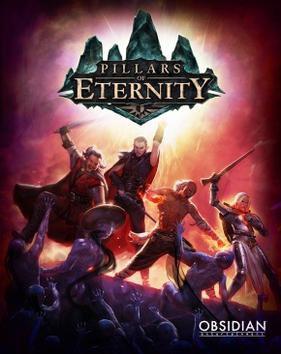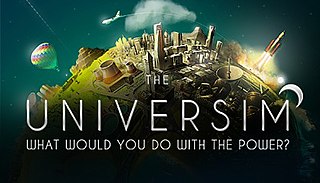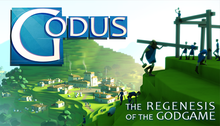
Populous is a video game developed by Bullfrog Productions and published by Electronic Arts, released originally for the Amiga in 1989, and is regarded by many as the first god game. With over four million copies sold, Populous is one of the best-selling PC games of all time.

Peter Douglas Molyneux is an English video game designer and programmer. He created the god games Populous, Dungeon Keeper, and Black & White, as well as Theme Park, the Fable series, Curiosity: What's Inside the Cube?, and Godus. In 2012 he founded and currently runs 22cans, a video game development studio.

Bullfrog Productions Limited was a British video game developer based in Guildford, England. Founded in 1987 by Peter Molyneux and Les Edgar, the company gained recognition in 1989 for their third release, Populous, and is also well known for titles such as Theme Park, Theme Hospital, Magic Carpet, Syndicate and Dungeon Keeper. Bullfrog's name was derived from an ornament in the offices of Edgar's and Molyneux's other enterprise, Taurus Impact Systems, Bullfrog's precursor where Molyneux and Edgar were developing business software. Bullfrog Productions was founded as a separate entity after Commodore mistook Taurus for a similarly named company.

Broken Age is a point-and-click adventure video game developed and published by Double Fine. Broken Age was game director Tim Schafer's first return to the genre since 1998's Grim Fandango, and was released for Microsoft Windows, macOS, Linux, iOS, Android, PlayStation 4, PlayStation Vita, and Xbox One platforms. The game was developed in two acts; the first was released on January 28, 2014, and the second was released on April 28, 2015. A retail version of the complete game for Windows, macOS, and Linux, published by Nordic Games, was released on April 28, 2015. A Nintendo Switch version was released on September 13, 2018.

Wasteland 2 is a post-apocalyptic role-playing video game developed by inXile Entertainment and published by Deep Silver. It is the sequel to 1988's Wasteland, and was successfully crowdfunded through Kickstarter. After the postponement of the original release date from October 2013, it was released for Microsoft Windows, OS X, and Linux in September 2014. An enhanced version of the game, named Wasteland 2: Director's Cut, was released in October 2015, including versions for PlayStation 4, Xbox One, and Nintendo Switch.

The Banner Saga is a tactical role-playing video game developed by Stoic and published by Versus Evil. It was released for personal computers and mobile phones in 2014, for PlayStation 4 and Xbox One in 2016 and for Nintendo Switch in 2018.

22cans Ltd is a British video game developer based in Guildford. It was founded in February 2012 by Peter Molyneux, previously of Bullfrog Productions and Lionhead Studios.
Video game development has typically been funded by large publishing companies or are alternatively paid for mostly by the developers themselves as independent titles. Other funding may come from government incentives or from private funding.

Planetary Annihilation is a real-time strategy PC game originally developed by Uber Entertainment, whose staff included several video game industry veterans who worked on Total Annihilation and Supreme Commander. The game was released in 2014, and the stand-alone expansion Planetary Annihilation: Titans was released in 2015.

Pillars of Eternity is a role-playing video game developed by Obsidian Entertainment and published by Paradox Interactive. It was released for Microsoft Windows, OS X, and Linux on March 26, 2015. The game is a spiritual successor to the Baldur's Gate and Icewind Dale series, along with Planescape: Torment. Obsidian started a crowdfunding campaign on Kickstarter for it in September 2012. The campaign raised over US$4 million, which was the highest funded video game at the time. The game uses the Unity engine.

Curiosity – What's Inside the Cube? was an experimental video game by Peter Molyneux's studio 22cans. Originally called Curiosity, the game was later renamed to avoid confusion with the Mars rover. The social experiment ended on 26 May 2013 and was won by Bryan Henderson from Edinburgh, Scotland. The game was met with controversy after the reward ended up being less "life-changing" than claimed, and ultimately nearly nonexistent due to the commercial failure of Godus.

Strike Suit Zero is a space flight combat game developed by Born Ready. Strike Suit Zero seeks to revive the space combat genre by introducing "strike mode" as a new element to the dogfight-based gameplay of classic space combat games. Strike Suit Zero takes its inspiration from numerous different franchises, most notably Elite and related franchises: Homeworld, Freelancer, Colony Wars, Star Wars, Gundam, Macross and FreeSpace. The game is built on a proprietary engine. It was released for Microsoft Windows on January 23, 2013, and for OS X and Linux on August 9, 2013.

War for the Overworld is a real-time strategy video game developed by Brightrock Games based in Brighton, UK. The game started as a crowdfunding campaign on Kickstarter, which ran from November 29, 2012, to January 3, 2013. In the game, players build dungeons containing deadly traps to kill adventuring heroes that enter. The game is inspired by Dungeon Keeper, StarCraft, Overlord, and Evil Genius. It includes a campaign, sandbox mode, and online multiplayer.

Torment: Tides of Numenera is a role-playing video game developed by inXile Entertainment and published by Techland Publishing for Microsoft Windows, macOS, Linux, PlayStation 4 and Xbox One. It is a spiritual successor to 1999's Planescape: Torment.

Wreckfest is a racing video game developed by Bugbear Entertainment and published by THQ Nordic. Wreckfest is described as the spiritual successor to the FlatOut series and a cross between FlatOut, Destruction Derby and cult 1989 PC racer Street Rod. A notable feature of the game engine is the use of soft-body damage modelling, which enables location-based damage that affects the driving dynamics of vehicles in a realistic fashion.

The Long Dark is a first-person survival video game developed and published by Hinterland Studios. The player assumes the role of crash-landed bush pilot Will Mackenzie who must survive the frigid Canadian wilderness after a geomagnetic storm. The game received seed financing from the Canada Media Fund, and further funding was secured through a successful Kickstarter campaign in October 2013.

Hand of Fate is an action role-playing roguelike deck-building game developed and published by Australian studio Defiant Development for Linux, macOS, Microsoft Windows, PlayStation 4, and Xbox One, released via early access on 7 July 2014, and then in the full release on 17 February 2015. A PlayStation Vita version was announced but ultimately cancelled due to development issues.

Harebrained Schemes, LLC is an American video game developer based in Seattle, Washington. It was co-founded in 2011 by Jordan Weisman and Mitch Gitelman. Prior to founding Harebrained Schemes, Weisman and Gitelman worked together on the MechCommander and Crimson Skies franchises at FASA, another company founded by Weisman. As of mid-2015, the studio had under 60 employees. The studio was acquired by Paradox Interactive in June 2018.

Road Redemption is a vehicular combat racing video game developed by EQ-Games and Pixel Dash Studios. The game is a spiritual successor to the Road Rash series and was released for Windows PC on October 4, 2017. Console versions of Road Redemption were released on November 6, 2018 for PlayStation 4, Xbox One, and Nintendo Switch. A mobile version of Road Redemption were released on September 28, 2022 for Android and iOS.

The Universim is a 2024 indie simulation god game developed and published by Crytivo for Microsoft Windows, MacOS, and Linux. Designed by Alexander Koshelkov, it has the player take the role of God to guide the development of civilization throughout the ages. Development was funded by a Kickstarter crowdfunding campaign in April 2014. The Universim was released in early access for Steam in 2018.



















